Impact of Global Financial Crisis on UK
VerifiedAdded on 2020/04/21
|16
|3610
|36
AI Summary
This assignment delves into the consequences of the 2008 Global Financial Crisis on the United Kingdom. It examines various facets of the crisis's impact, including government policies implemented to mitigate the effects, institutional responses, and the resulting changes in unemployment rates, particularly among youth. The analysis draws upon a range of academic sources to provide a comprehensive understanding of the UK's experience during this period.
Contribute Materials
Your contribution can guide someone’s learning journey. Share your
documents today.
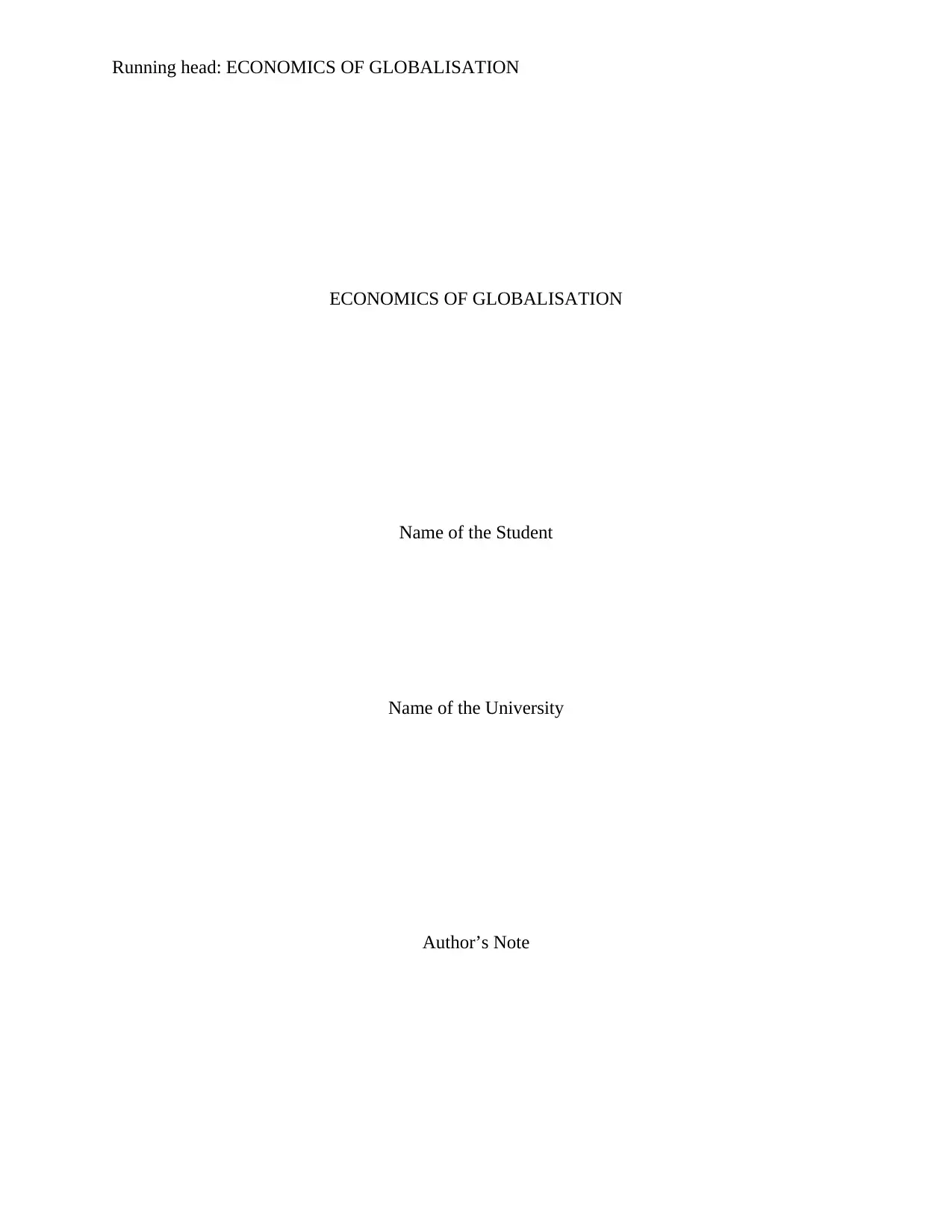
Running head: ECONOMICS OF GLOBALISATION
ECONOMICS OF GLOBALISATION
Name of the Student
Name of the University
Author’s Note
ECONOMICS OF GLOBALISATION
Name of the Student
Name of the University
Author’s Note
Secure Best Marks with AI Grader
Need help grading? Try our AI Grader for instant feedback on your assignments.
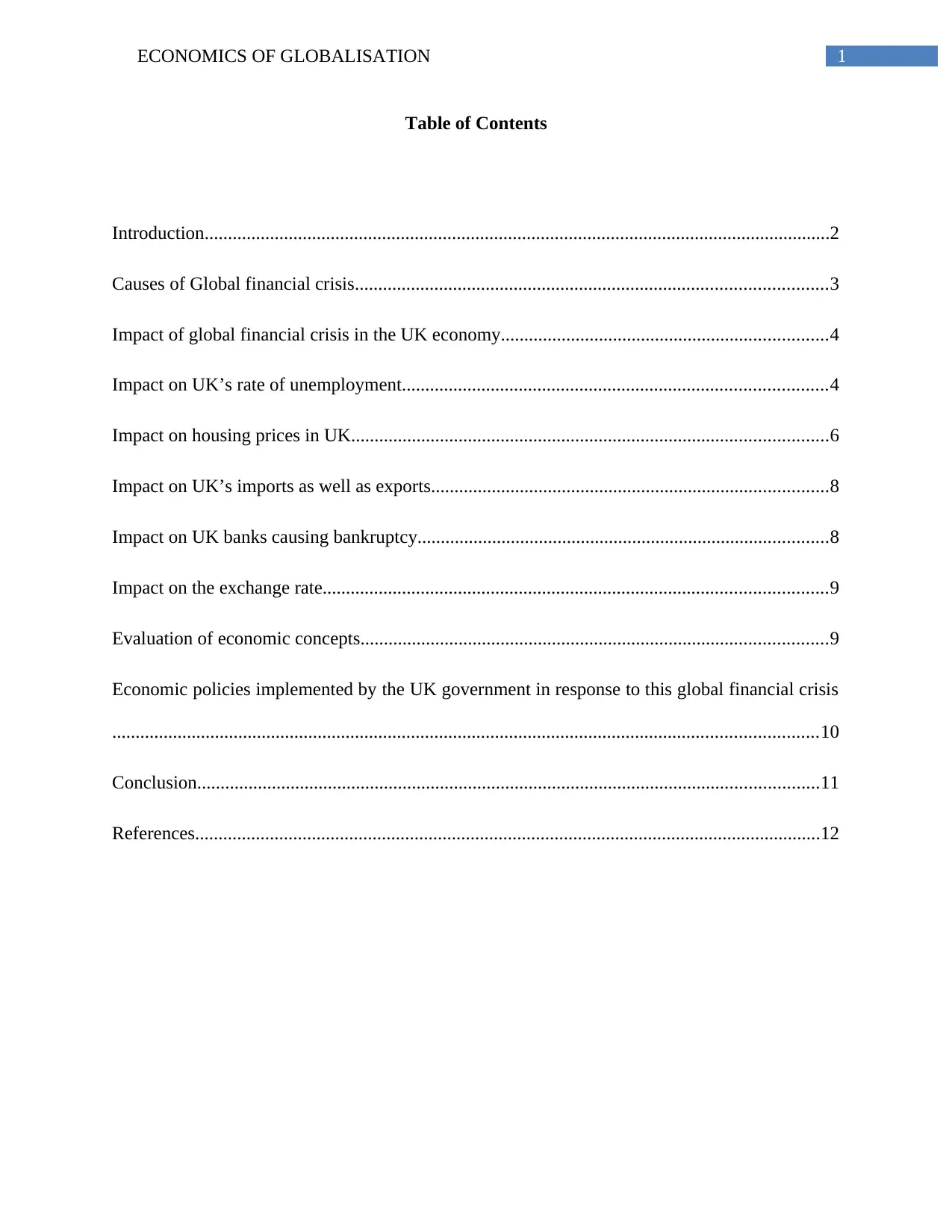
1ECONOMICS OF GLOBALISATION
Table of Contents
Introduction......................................................................................................................................2
Causes of Global financial crisis.....................................................................................................3
Impact of global financial crisis in the UK economy......................................................................4
Impact on UK’s rate of unemployment...........................................................................................4
Impact on housing prices in UK......................................................................................................6
Impact on UK’s imports as well as exports.....................................................................................8
Impact on UK banks causing bankruptcy........................................................................................8
Impact on the exchange rate............................................................................................................9
Evaluation of economic concepts....................................................................................................9
Economic policies implemented by the UK government in response to this global financial crisis
.......................................................................................................................................................10
Conclusion.....................................................................................................................................11
References......................................................................................................................................12
Table of Contents
Introduction......................................................................................................................................2
Causes of Global financial crisis.....................................................................................................3
Impact of global financial crisis in the UK economy......................................................................4
Impact on UK’s rate of unemployment...........................................................................................4
Impact on housing prices in UK......................................................................................................6
Impact on UK’s imports as well as exports.....................................................................................8
Impact on UK banks causing bankruptcy........................................................................................8
Impact on the exchange rate............................................................................................................9
Evaluation of economic concepts....................................................................................................9
Economic policies implemented by the UK government in response to this global financial crisis
.......................................................................................................................................................10
Conclusion.....................................................................................................................................11
References......................................................................................................................................12
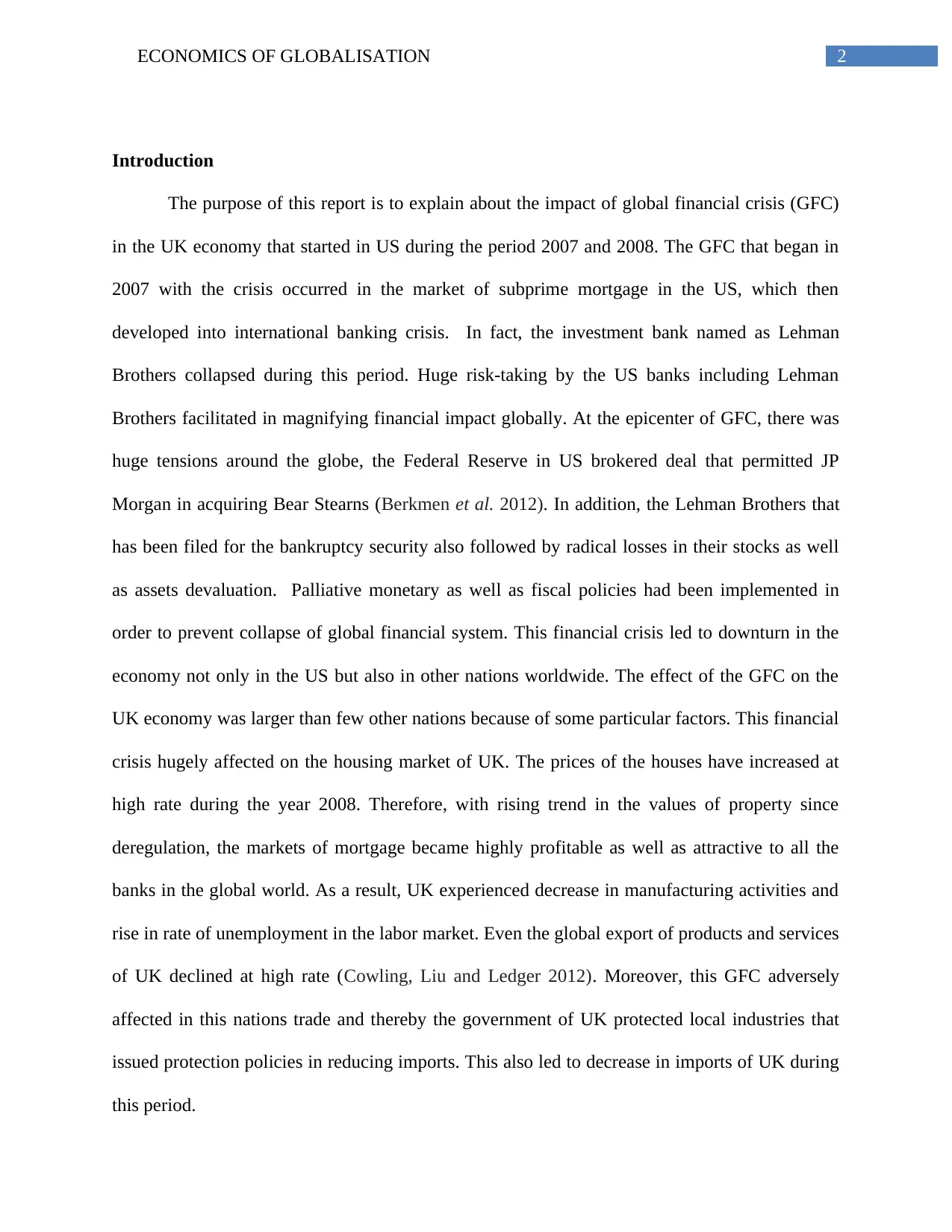
2ECONOMICS OF GLOBALISATION
Introduction
The purpose of this report is to explain about the impact of global financial crisis (GFC)
in the UK economy that started in US during the period 2007 and 2008. The GFC that began in
2007 with the crisis occurred in the market of subprime mortgage in the US, which then
developed into international banking crisis. In fact, the investment bank named as Lehman
Brothers collapsed during this period. Huge risk-taking by the US banks including Lehman
Brothers facilitated in magnifying financial impact globally. At the epicenter of GFC, there was
huge tensions around the globe, the Federal Reserve in US brokered deal that permitted JP
Morgan in acquiring Bear Stearns (Berkmen et al. 2012). In addition, the Lehman Brothers that
has been filed for the bankruptcy security also followed by radical losses in their stocks as well
as assets devaluation. Palliative monetary as well as fiscal policies had been implemented in
order to prevent collapse of global financial system. This financial crisis led to downturn in the
economy not only in the US but also in other nations worldwide. The effect of the GFC on the
UK economy was larger than few other nations because of some particular factors. This financial
crisis hugely affected on the housing market of UK. The prices of the houses have increased at
high rate during the year 2008. Therefore, with rising trend in the values of property since
deregulation, the markets of mortgage became highly profitable as well as attractive to all the
banks in the global world. As a result, UK experienced decrease in manufacturing activities and
rise in rate of unemployment in the labor market. Even the global export of products and services
of UK declined at high rate (Cowling, Liu and Ledger 2012). Moreover, this GFC adversely
affected in this nations trade and thereby the government of UK protected local industries that
issued protection policies in reducing imports. This also led to decrease in imports of UK during
this period.
Introduction
The purpose of this report is to explain about the impact of global financial crisis (GFC)
in the UK economy that started in US during the period 2007 and 2008. The GFC that began in
2007 with the crisis occurred in the market of subprime mortgage in the US, which then
developed into international banking crisis. In fact, the investment bank named as Lehman
Brothers collapsed during this period. Huge risk-taking by the US banks including Lehman
Brothers facilitated in magnifying financial impact globally. At the epicenter of GFC, there was
huge tensions around the globe, the Federal Reserve in US brokered deal that permitted JP
Morgan in acquiring Bear Stearns (Berkmen et al. 2012). In addition, the Lehman Brothers that
has been filed for the bankruptcy security also followed by radical losses in their stocks as well
as assets devaluation. Palliative monetary as well as fiscal policies had been implemented in
order to prevent collapse of global financial system. This financial crisis led to downturn in the
economy not only in the US but also in other nations worldwide. The effect of the GFC on the
UK economy was larger than few other nations because of some particular factors. This financial
crisis hugely affected on the housing market of UK. The prices of the houses have increased at
high rate during the year 2008. Therefore, with rising trend in the values of property since
deregulation, the markets of mortgage became highly profitable as well as attractive to all the
banks in the global world. As a result, UK experienced decrease in manufacturing activities and
rise in rate of unemployment in the labor market. Even the global export of products and services
of UK declined at high rate (Cowling, Liu and Ledger 2012). Moreover, this GFC adversely
affected in this nations trade and thereby the government of UK protected local industries that
issued protection policies in reducing imports. This also led to decrease in imports of UK during
this period.
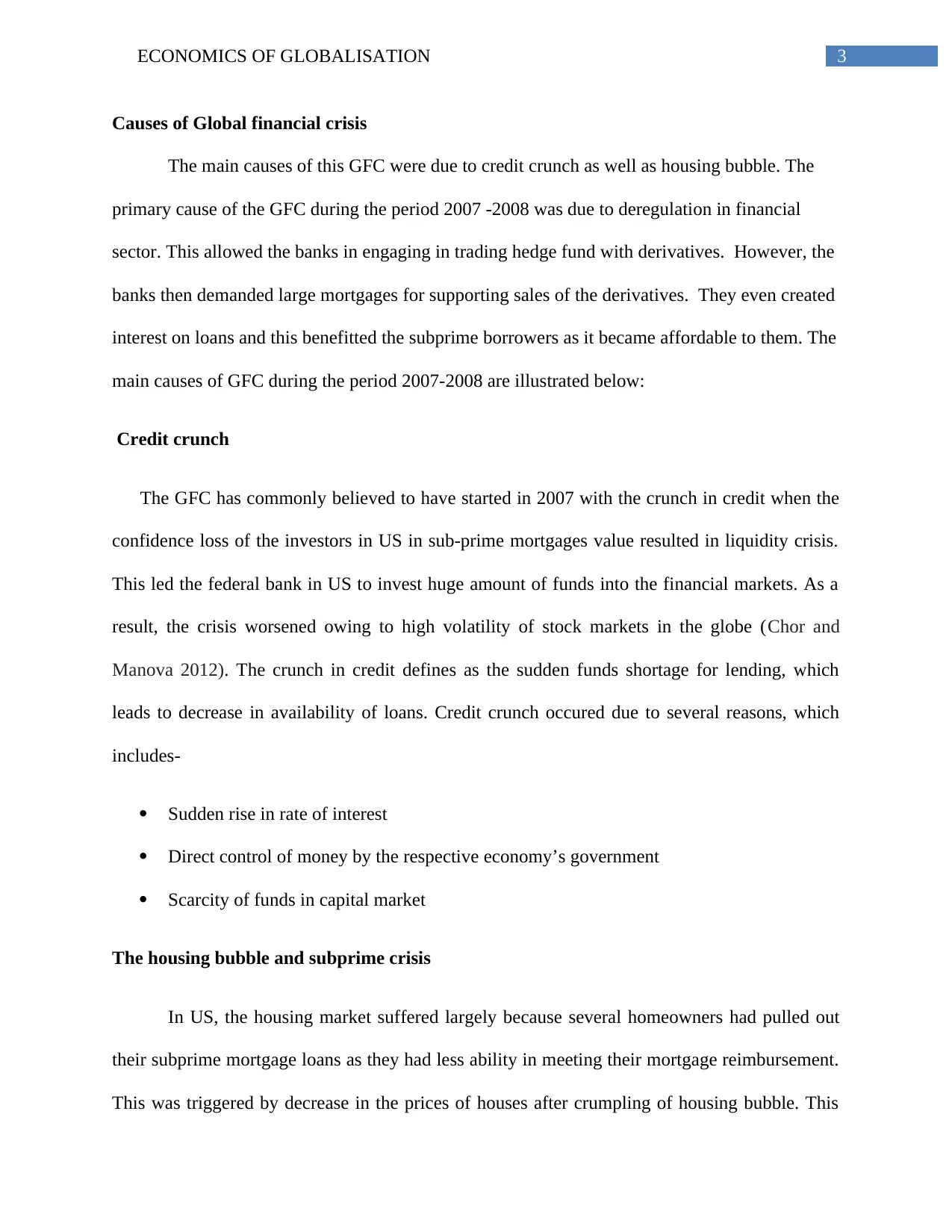
3ECONOMICS OF GLOBALISATION
Causes of Global financial crisis
The main causes of this GFC were due to credit crunch as well as housing bubble. The
primary cause of the GFC during the period 2007 -2008 was due to deregulation in financial
sector. This allowed the banks in engaging in trading hedge fund with derivatives. However, the
banks then demanded large mortgages for supporting sales of the derivatives. They even created
interest on loans and this benefitted the subprime borrowers as it became affordable to them. The
main causes of GFC during the period 2007-2008 are illustrated below:
Credit crunch
The GFC has commonly believed to have started in 2007 with the crunch in credit when the
confidence loss of the investors in US in sub-prime mortgages value resulted in liquidity crisis.
This led the federal bank in US to invest huge amount of funds into the financial markets. As a
result, the crisis worsened owing to high volatility of stock markets in the globe (Chor and
Manova 2012). The crunch in credit defines as the sudden funds shortage for lending, which
leads to decrease in availability of loans. Credit crunch occured due to several reasons, which
includes-
Sudden rise in rate of interest
Direct control of money by the respective economy’s government
Scarcity of funds in capital market
The housing bubble and subprime crisis
In US, the housing market suffered largely because several homeowners had pulled out
their subprime mortgage loans as they had less ability in meeting their mortgage reimbursement.
This was triggered by decrease in the prices of houses after crumpling of housing bubble. This
Causes of Global financial crisis
The main causes of this GFC were due to credit crunch as well as housing bubble. The
primary cause of the GFC during the period 2007 -2008 was due to deregulation in financial
sector. This allowed the banks in engaging in trading hedge fund with derivatives. However, the
banks then demanded large mortgages for supporting sales of the derivatives. They even created
interest on loans and this benefitted the subprime borrowers as it became affordable to them. The
main causes of GFC during the period 2007-2008 are illustrated below:
Credit crunch
The GFC has commonly believed to have started in 2007 with the crunch in credit when the
confidence loss of the investors in US in sub-prime mortgages value resulted in liquidity crisis.
This led the federal bank in US to invest huge amount of funds into the financial markets. As a
result, the crisis worsened owing to high volatility of stock markets in the globe (Chor and
Manova 2012). The crunch in credit defines as the sudden funds shortage for lending, which
leads to decrease in availability of loans. Credit crunch occured due to several reasons, which
includes-
Sudden rise in rate of interest
Direct control of money by the respective economy’s government
Scarcity of funds in capital market
The housing bubble and subprime crisis
In US, the housing market suffered largely because several homeowners had pulled out
their subprime mortgage loans as they had less ability in meeting their mortgage reimbursement.
This was triggered by decrease in the prices of houses after crumpling of housing bubble. This
Secure Best Marks with AI Grader
Need help grading? Try our AI Grader for instant feedback on your assignments.
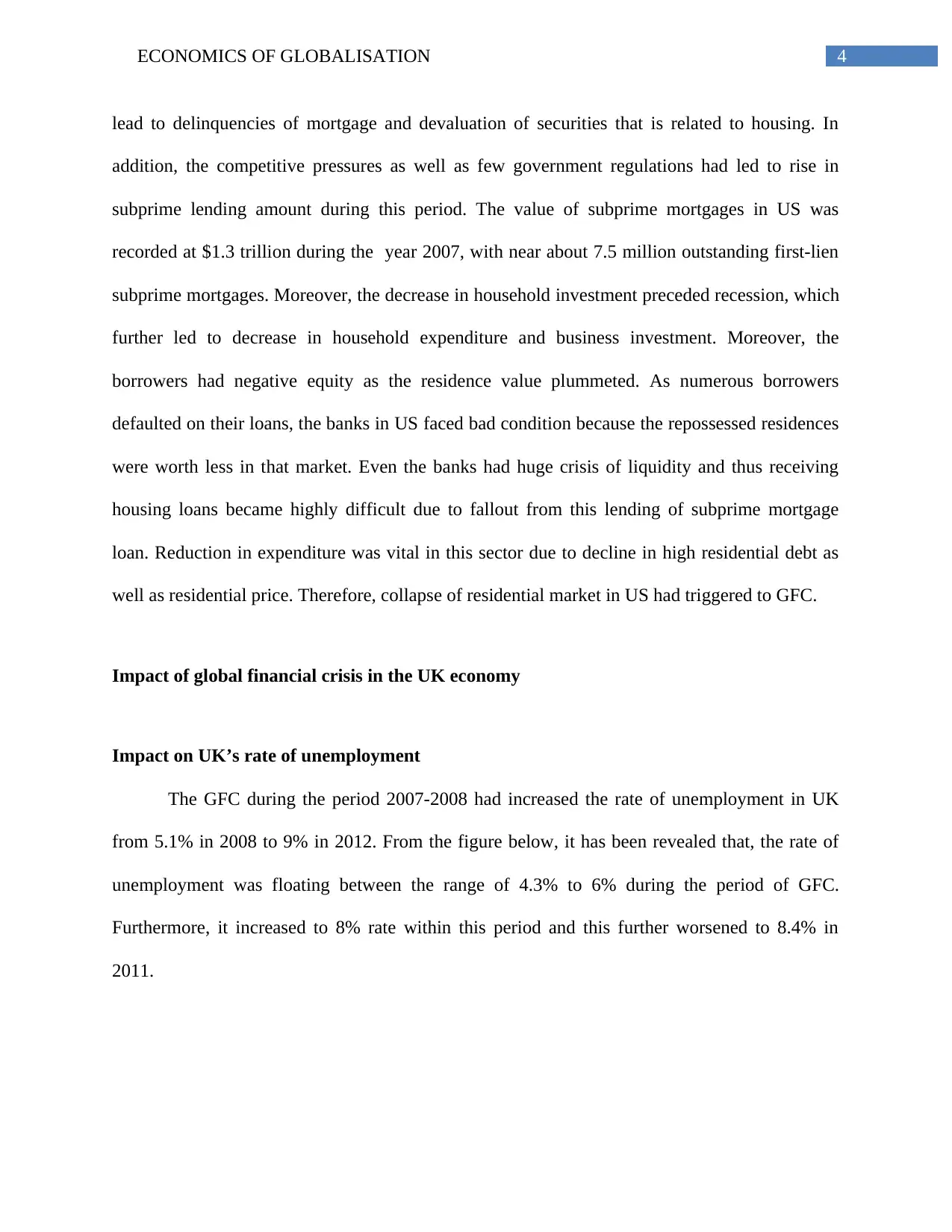
4ECONOMICS OF GLOBALISATION
lead to delinquencies of mortgage and devaluation of securities that is related to housing. In
addition, the competitive pressures as well as few government regulations had led to rise in
subprime lending amount during this period. The value of subprime mortgages in US was
recorded at $1.3 trillion during the year 2007, with near about 7.5 million outstanding first-lien
subprime mortgages. Moreover, the decrease in household investment preceded recession, which
further led to decrease in household expenditure and business investment. Moreover, the
borrowers had negative equity as the residence value plummeted. As numerous borrowers
defaulted on their loans, the banks in US faced bad condition because the repossessed residences
were worth less in that market. Even the banks had huge crisis of liquidity and thus receiving
housing loans became highly difficult due to fallout from this lending of subprime mortgage
loan. Reduction in expenditure was vital in this sector due to decline in high residential debt as
well as residential price. Therefore, collapse of residential market in US had triggered to GFC.
Impact of global financial crisis in the UK economy
Impact on UK’s rate of unemployment
The GFC during the period 2007-2008 had increased the rate of unemployment in UK
from 5.1% in 2008 to 9% in 2012. From the figure below, it has been revealed that, the rate of
unemployment was floating between the range of 4.3% to 6% during the period of GFC.
Furthermore, it increased to 8% rate within this period and this further worsened to 8.4% in
2011.
lead to delinquencies of mortgage and devaluation of securities that is related to housing. In
addition, the competitive pressures as well as few government regulations had led to rise in
subprime lending amount during this period. The value of subprime mortgages in US was
recorded at $1.3 trillion during the year 2007, with near about 7.5 million outstanding first-lien
subprime mortgages. Moreover, the decrease in household investment preceded recession, which
further led to decrease in household expenditure and business investment. Moreover, the
borrowers had negative equity as the residence value plummeted. As numerous borrowers
defaulted on their loans, the banks in US faced bad condition because the repossessed residences
were worth less in that market. Even the banks had huge crisis of liquidity and thus receiving
housing loans became highly difficult due to fallout from this lending of subprime mortgage
loan. Reduction in expenditure was vital in this sector due to decline in high residential debt as
well as residential price. Therefore, collapse of residential market in US had triggered to GFC.
Impact of global financial crisis in the UK economy
Impact on UK’s rate of unemployment
The GFC during the period 2007-2008 had increased the rate of unemployment in UK
from 5.1% in 2008 to 9% in 2012. From the figure below, it has been revealed that, the rate of
unemployment was floating between the range of 4.3% to 6% during the period of GFC.
Furthermore, it increased to 8% rate within this period and this further worsened to 8.4% in
2011.
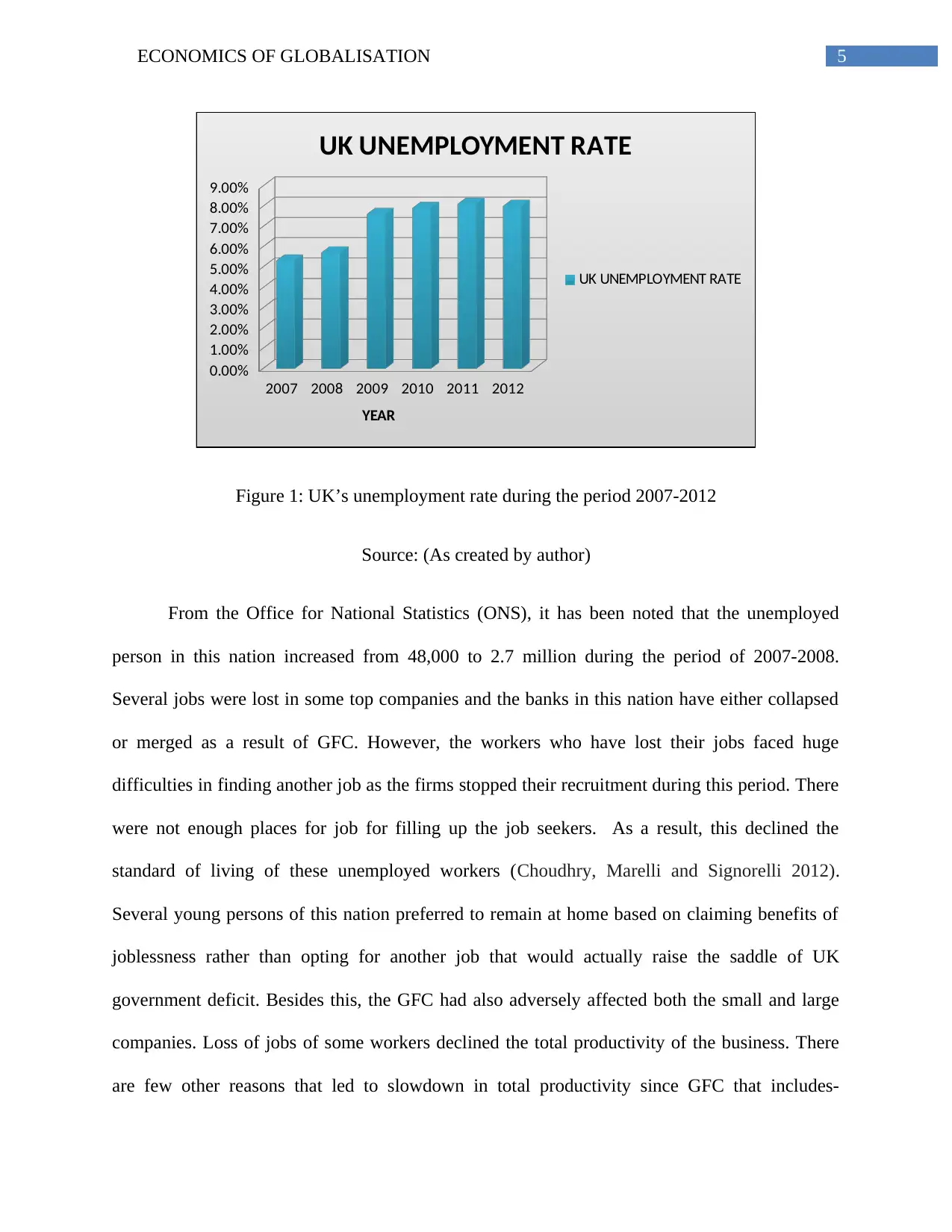
5ECONOMICS OF GLOBALISATION
2007 2008 2009 2010 2011 2012
0.00%
1.00%
2.00%
3.00%
4.00%
5.00%
6.00%
7.00%
8.00%
9.00%
UK UNEMPLOYMENT RATE
UK UNEMPLOYMENT RATE
YEAR
Figure 1: UK’s unemployment rate during the period 2007-2012
Source: (As created by author)
From the Office for National Statistics (ONS), it has been noted that the unemployed
person in this nation increased from 48,000 to 2.7 million during the period of 2007-2008.
Several jobs were lost in some top companies and the banks in this nation have either collapsed
or merged as a result of GFC. However, the workers who have lost their jobs faced huge
difficulties in finding another job as the firms stopped their recruitment during this period. There
were not enough places for job for filling up the job seekers. As a result, this declined the
standard of living of these unemployed workers (Choudhry, Marelli and Signorelli 2012).
Several young persons of this nation preferred to remain at home based on claiming benefits of
joblessness rather than opting for another job that would actually raise the saddle of UK
government deficit. Besides this, the GFC had also adversely affected both the small and large
companies. Loss of jobs of some workers declined the total productivity of the business. There
are few other reasons that led to slowdown in total productivity since GFC that includes-
2007 2008 2009 2010 2011 2012
0.00%
1.00%
2.00%
3.00%
4.00%
5.00%
6.00%
7.00%
8.00%
9.00%
UK UNEMPLOYMENT RATE
UK UNEMPLOYMENT RATE
YEAR
Figure 1: UK’s unemployment rate during the period 2007-2012
Source: (As created by author)
From the Office for National Statistics (ONS), it has been noted that the unemployed
person in this nation increased from 48,000 to 2.7 million during the period of 2007-2008.
Several jobs were lost in some top companies and the banks in this nation have either collapsed
or merged as a result of GFC. However, the workers who have lost their jobs faced huge
difficulties in finding another job as the firms stopped their recruitment during this period. There
were not enough places for job for filling up the job seekers. As a result, this declined the
standard of living of these unemployed workers (Choudhry, Marelli and Signorelli 2012).
Several young persons of this nation preferred to remain at home based on claiming benefits of
joblessness rather than opting for another job that would actually raise the saddle of UK
government deficit. Besides this, the GFC had also adversely affected both the small and large
companies. Loss of jobs of some workers declined the total productivity of the business. There
are few other reasons that led to slowdown in total productivity since GFC that includes-
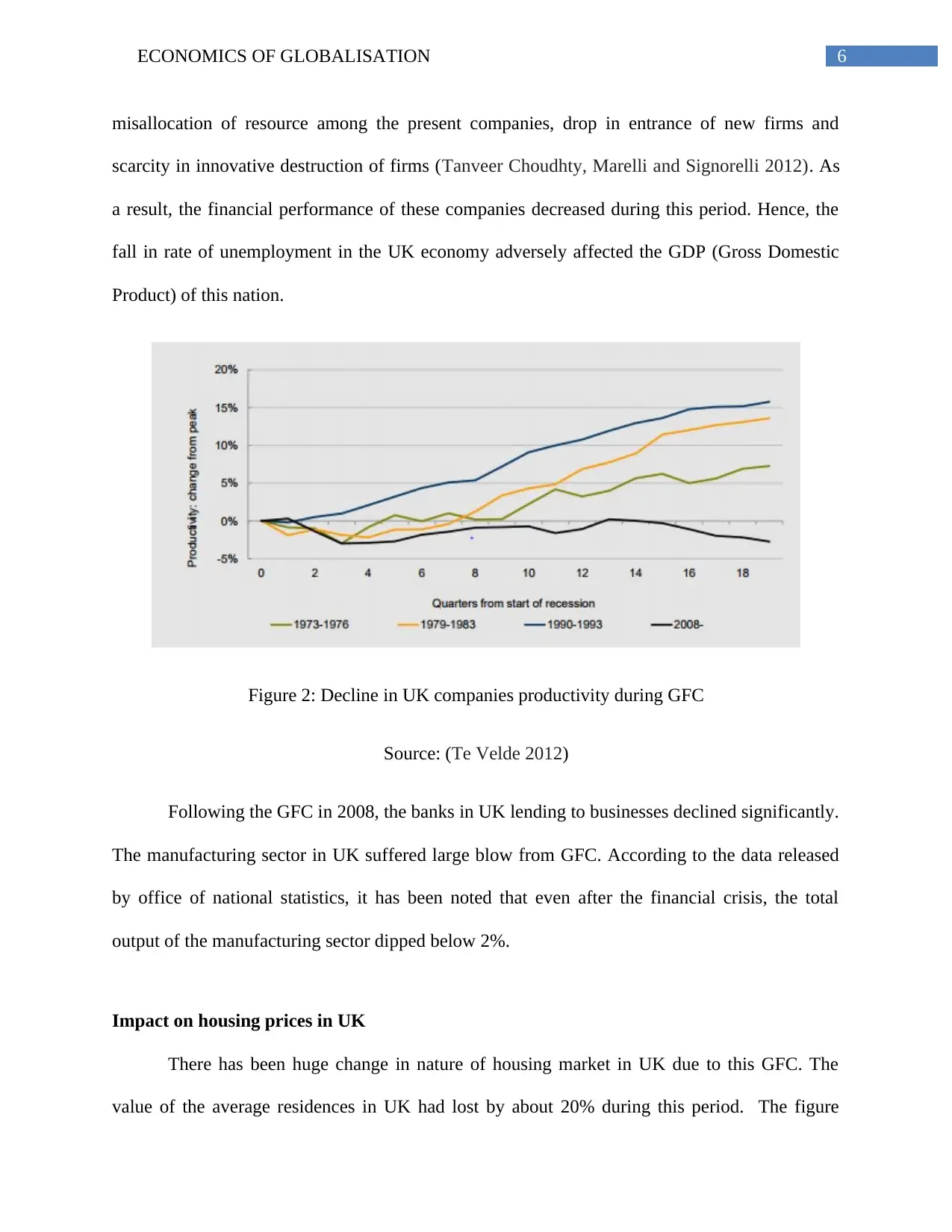
6ECONOMICS OF GLOBALISATION
misallocation of resource among the present companies, drop in entrance of new firms and
scarcity in innovative destruction of firms (Tanveer Choudhty, Marelli and Signorelli 2012). As
a result, the financial performance of these companies decreased during this period. Hence, the
fall in rate of unemployment in the UK economy adversely affected the GDP (Gross Domestic
Product) of this nation.
Figure 2: Decline in UK companies productivity during GFC
Source: (Te Velde 2012)
Following the GFC in 2008, the banks in UK lending to businesses declined significantly.
The manufacturing sector in UK suffered large blow from GFC. According to the data released
by office of national statistics, it has been noted that even after the financial crisis, the total
output of the manufacturing sector dipped below 2%.
Impact on housing prices in UK
There has been huge change in nature of housing market in UK due to this GFC. The
value of the average residences in UK had lost by about 20% during this period. The figure
misallocation of resource among the present companies, drop in entrance of new firms and
scarcity in innovative destruction of firms (Tanveer Choudhty, Marelli and Signorelli 2012). As
a result, the financial performance of these companies decreased during this period. Hence, the
fall in rate of unemployment in the UK economy adversely affected the GDP (Gross Domestic
Product) of this nation.
Figure 2: Decline in UK companies productivity during GFC
Source: (Te Velde 2012)
Following the GFC in 2008, the banks in UK lending to businesses declined significantly.
The manufacturing sector in UK suffered large blow from GFC. According to the data released
by office of national statistics, it has been noted that even after the financial crisis, the total
output of the manufacturing sector dipped below 2%.
Impact on housing prices in UK
There has been huge change in nature of housing market in UK due to this GFC. The
value of the average residences in UK had lost by about 20% during this period. The figure
Paraphrase This Document
Need a fresh take? Get an instant paraphrase of this document with our AI Paraphraser
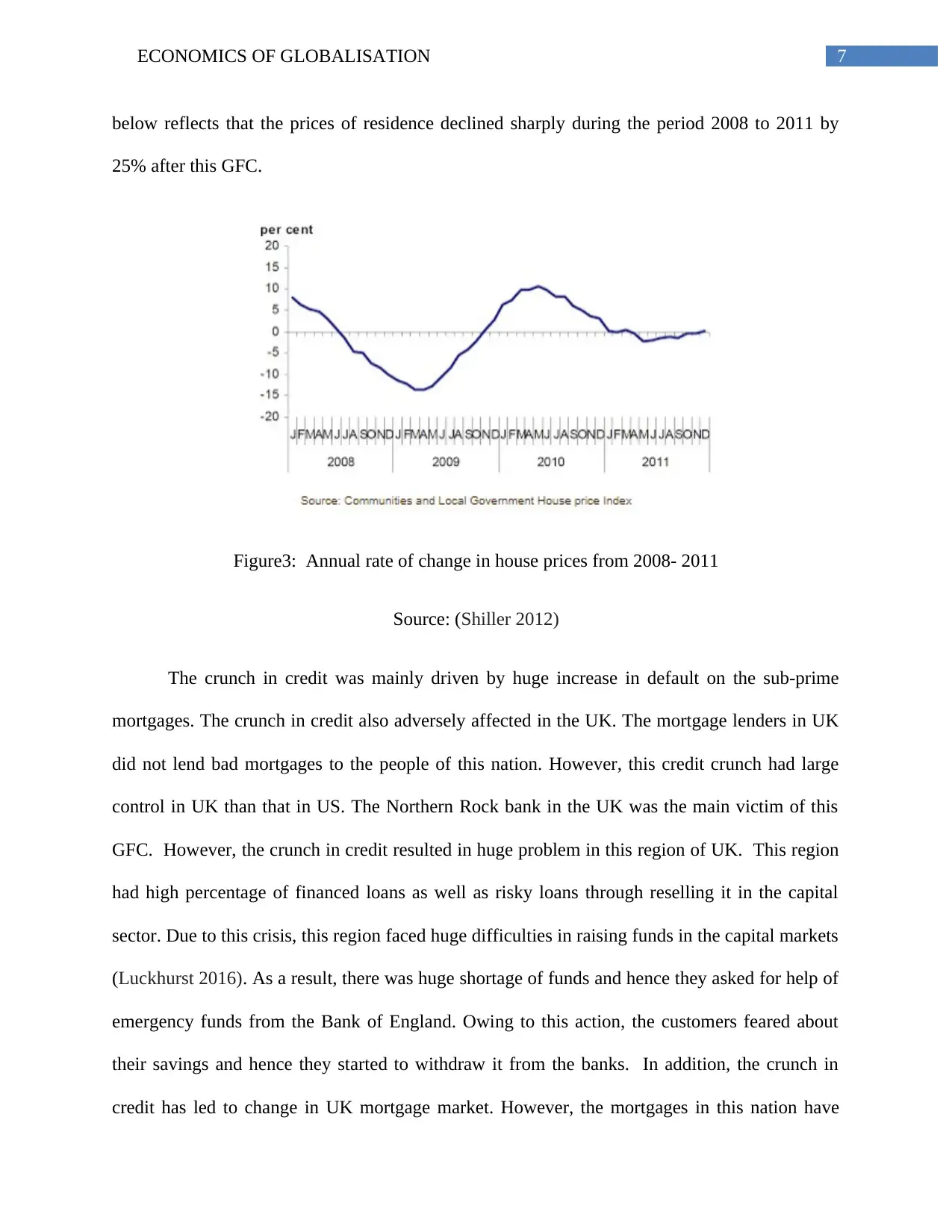
7ECONOMICS OF GLOBALISATION
below reflects that the prices of residence declined sharply during the period 2008 to 2011 by
25% after this GFC.
Figure3: Annual rate of change in house prices from 2008- 2011
Source: (Shiller 2012)
The crunch in credit was mainly driven by huge increase in default on the sub-prime
mortgages. The crunch in credit also adversely affected in the UK. The mortgage lenders in UK
did not lend bad mortgages to the people of this nation. However, this credit crunch had large
control in UK than that in US. The Northern Rock bank in the UK was the main victim of this
GFC. However, the crunch in credit resulted in huge problem in this region of UK. This region
had high percentage of financed loans as well as risky loans through reselling it in the capital
sector. Due to this crisis, this region faced huge difficulties in raising funds in the capital markets
(Luckhurst 2016). As a result, there was huge shortage of funds and hence they asked for help of
emergency funds from the Bank of England. Owing to this action, the customers feared about
their savings and hence they started to withdraw it from the banks. In addition, the crunch in
credit has led to change in UK mortgage market. However, the mortgages in this nation have
below reflects that the prices of residence declined sharply during the period 2008 to 2011 by
25% after this GFC.
Figure3: Annual rate of change in house prices from 2008- 2011
Source: (Shiller 2012)
The crunch in credit was mainly driven by huge increase in default on the sub-prime
mortgages. The crunch in credit also adversely affected in the UK. The mortgage lenders in UK
did not lend bad mortgages to the people of this nation. However, this credit crunch had large
control in UK than that in US. The Northern Rock bank in the UK was the main victim of this
GFC. However, the crunch in credit resulted in huge problem in this region of UK. This region
had high percentage of financed loans as well as risky loans through reselling it in the capital
sector. Due to this crisis, this region faced huge difficulties in raising funds in the capital markets
(Luckhurst 2016). As a result, there was huge shortage of funds and hence they asked for help of
emergency funds from the Bank of England. Owing to this action, the customers feared about
their savings and hence they started to withdraw it from the banks. In addition, the crunch in
credit has led to change in UK mortgage market. However, the mortgages in this nation have
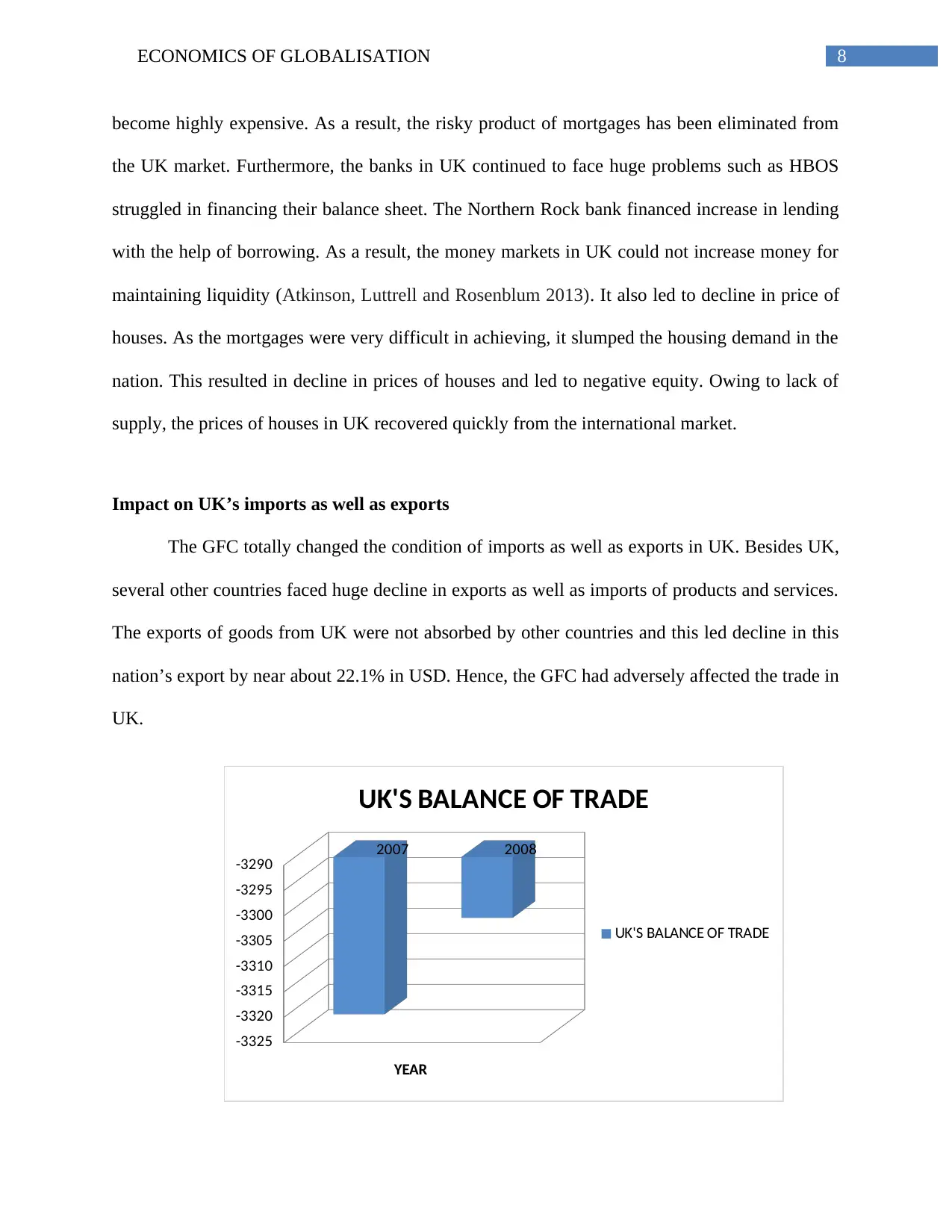
8ECONOMICS OF GLOBALISATION
become highly expensive. As a result, the risky product of mortgages has been eliminated from
the UK market. Furthermore, the banks in UK continued to face huge problems such as HBOS
struggled in financing their balance sheet. The Northern Rock bank financed increase in lending
with the help of borrowing. As a result, the money markets in UK could not increase money for
maintaining liquidity (Atkinson, Luttrell and Rosenblum 2013). It also led to decline in price of
houses. As the mortgages were very difficult in achieving, it slumped the housing demand in the
nation. This resulted in decline in prices of houses and led to negative equity. Owing to lack of
supply, the prices of houses in UK recovered quickly from the international market.
Impact on UK’s imports as well as exports
The GFC totally changed the condition of imports as well as exports in UK. Besides UK,
several other countries faced huge decline in exports as well as imports of products and services.
The exports of goods from UK were not absorbed by other countries and this led decline in this
nation’s export by near about 22.1% in USD. Hence, the GFC had adversely affected the trade in
UK.
2007 2008
-3325
-3320
-3315
-3310
-3305
-3300
-3295
-3290
UK'S BALANCE OF TRADE
UK'S BALANCE OF TRADE
YEAR
become highly expensive. As a result, the risky product of mortgages has been eliminated from
the UK market. Furthermore, the banks in UK continued to face huge problems such as HBOS
struggled in financing their balance sheet. The Northern Rock bank financed increase in lending
with the help of borrowing. As a result, the money markets in UK could not increase money for
maintaining liquidity (Atkinson, Luttrell and Rosenblum 2013). It also led to decline in price of
houses. As the mortgages were very difficult in achieving, it slumped the housing demand in the
nation. This resulted in decline in prices of houses and led to negative equity. Owing to lack of
supply, the prices of houses in UK recovered quickly from the international market.
Impact on UK’s imports as well as exports
The GFC totally changed the condition of imports as well as exports in UK. Besides UK,
several other countries faced huge decline in exports as well as imports of products and services.
The exports of goods from UK were not absorbed by other countries and this led decline in this
nation’s export by near about 22.1% in USD. Hence, the GFC had adversely affected the trade in
UK.
2007 2008
-3325
-3320
-3315
-3310
-3305
-3300
-3295
-3290
UK'S BALANCE OF TRADE
UK'S BALANCE OF TRADE
YEAR
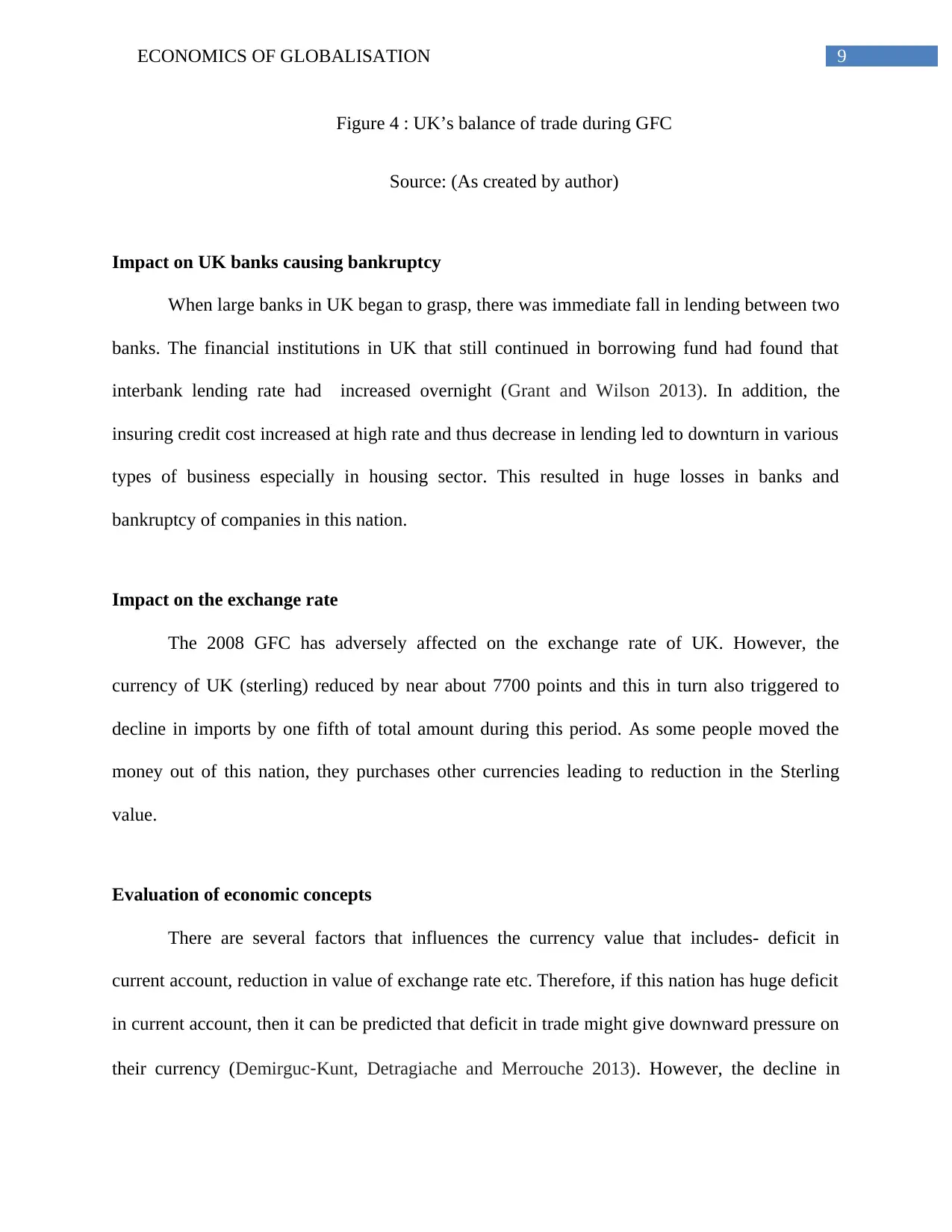
9ECONOMICS OF GLOBALISATION
Figure 4 : UK’s balance of trade during GFC
Source: (As created by author)
Impact on UK banks causing bankruptcy
When large banks in UK began to grasp, there was immediate fall in lending between two
banks. The financial institutions in UK that still continued in borrowing fund had found that
interbank lending rate had increased overnight (Grant and Wilson 2013). In addition, the
insuring credit cost increased at high rate and thus decrease in lending led to downturn in various
types of business especially in housing sector. This resulted in huge losses in banks and
bankruptcy of companies in this nation.
Impact on the exchange rate
The 2008 GFC has adversely affected on the exchange rate of UK. However, the
currency of UK (sterling) reduced by near about 7700 points and this in turn also triggered to
decline in imports by one fifth of total amount during this period. As some people moved the
money out of this nation, they purchases other currencies leading to reduction in the Sterling
value.
Evaluation of economic concepts
There are several factors that influences the currency value that includes- deficit in
current account, reduction in value of exchange rate etc. Therefore, if this nation has huge deficit
in current account, then it can be predicted that deficit in trade might give downward pressure on
their currency (Demirguc‐Kunt, Detragiache and Merrouche 2013). However, the decline in
Figure 4 : UK’s balance of trade during GFC
Source: (As created by author)
Impact on UK banks causing bankruptcy
When large banks in UK began to grasp, there was immediate fall in lending between two
banks. The financial institutions in UK that still continued in borrowing fund had found that
interbank lending rate had increased overnight (Grant and Wilson 2013). In addition, the
insuring credit cost increased at high rate and thus decrease in lending led to downturn in various
types of business especially in housing sector. This resulted in huge losses in banks and
bankruptcy of companies in this nation.
Impact on the exchange rate
The 2008 GFC has adversely affected on the exchange rate of UK. However, the
currency of UK (sterling) reduced by near about 7700 points and this in turn also triggered to
decline in imports by one fifth of total amount during this period. As some people moved the
money out of this nation, they purchases other currencies leading to reduction in the Sterling
value.
Evaluation of economic concepts
There are several factors that influences the currency value that includes- deficit in
current account, reduction in value of exchange rate etc. Therefore, if this nation has huge deficit
in current account, then it can be predicted that deficit in trade might give downward pressure on
their currency (Demirguc‐Kunt, Detragiache and Merrouche 2013). However, the decline in
Secure Best Marks with AI Grader
Need help grading? Try our AI Grader for instant feedback on your assignments.
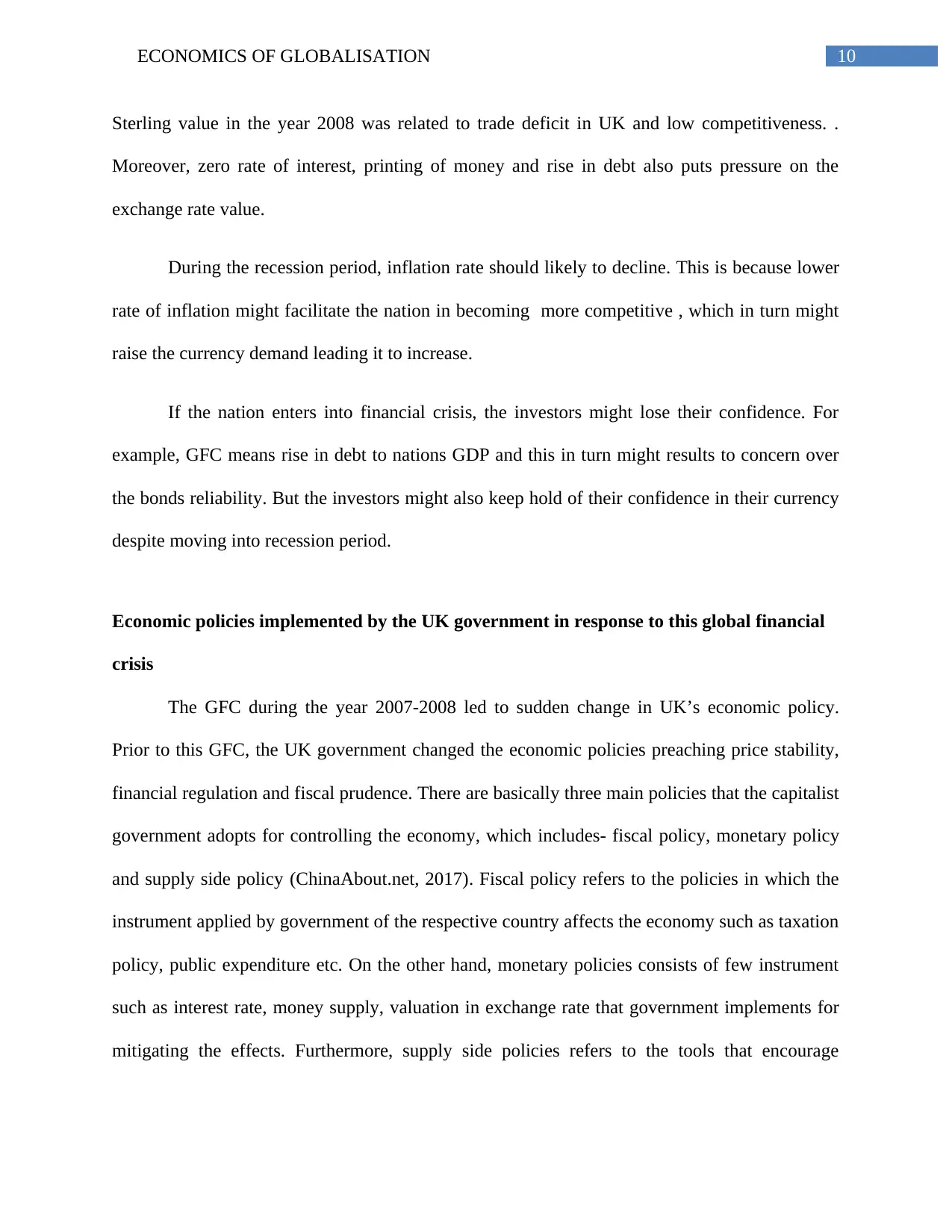
10ECONOMICS OF GLOBALISATION
Sterling value in the year 2008 was related to trade deficit in UK and low competitiveness. .
Moreover, zero rate of interest, printing of money and rise in debt also puts pressure on the
exchange rate value.
During the recession period, inflation rate should likely to decline. This is because lower
rate of inflation might facilitate the nation in becoming more competitive , which in turn might
raise the currency demand leading it to increase.
If the nation enters into financial crisis, the investors might lose their confidence. For
example, GFC means rise in debt to nations GDP and this in turn might results to concern over
the bonds reliability. But the investors might also keep hold of their confidence in their currency
despite moving into recession period.
Economic policies implemented by the UK government in response to this global financial
crisis
The GFC during the year 2007-2008 led to sudden change in UK’s economic policy.
Prior to this GFC, the UK government changed the economic policies preaching price stability,
financial regulation and fiscal prudence. There are basically three main policies that the capitalist
government adopts for controlling the economy, which includes- fiscal policy, monetary policy
and supply side policy (ChinaAbout.net, 2017). Fiscal policy refers to the policies in which the
instrument applied by government of the respective country affects the economy such as taxation
policy, public expenditure etc. On the other hand, monetary policies consists of few instrument
such as interest rate, money supply, valuation in exchange rate that government implements for
mitigating the effects. Furthermore, supply side policies refers to the tools that encourage
Sterling value in the year 2008 was related to trade deficit in UK and low competitiveness. .
Moreover, zero rate of interest, printing of money and rise in debt also puts pressure on the
exchange rate value.
During the recession period, inflation rate should likely to decline. This is because lower
rate of inflation might facilitate the nation in becoming more competitive , which in turn might
raise the currency demand leading it to increase.
If the nation enters into financial crisis, the investors might lose their confidence. For
example, GFC means rise in debt to nations GDP and this in turn might results to concern over
the bonds reliability. But the investors might also keep hold of their confidence in their currency
despite moving into recession period.
Economic policies implemented by the UK government in response to this global financial
crisis
The GFC during the year 2007-2008 led to sudden change in UK’s economic policy.
Prior to this GFC, the UK government changed the economic policies preaching price stability,
financial regulation and fiscal prudence. There are basically three main policies that the capitalist
government adopts for controlling the economy, which includes- fiscal policy, monetary policy
and supply side policy (ChinaAbout.net, 2017). Fiscal policy refers to the policies in which the
instrument applied by government of the respective country affects the economy such as taxation
policy, public expenditure etc. On the other hand, monetary policies consists of few instrument
such as interest rate, money supply, valuation in exchange rate that government implements for
mitigating the effects. Furthermore, supply side policies refers to the tools that encourage
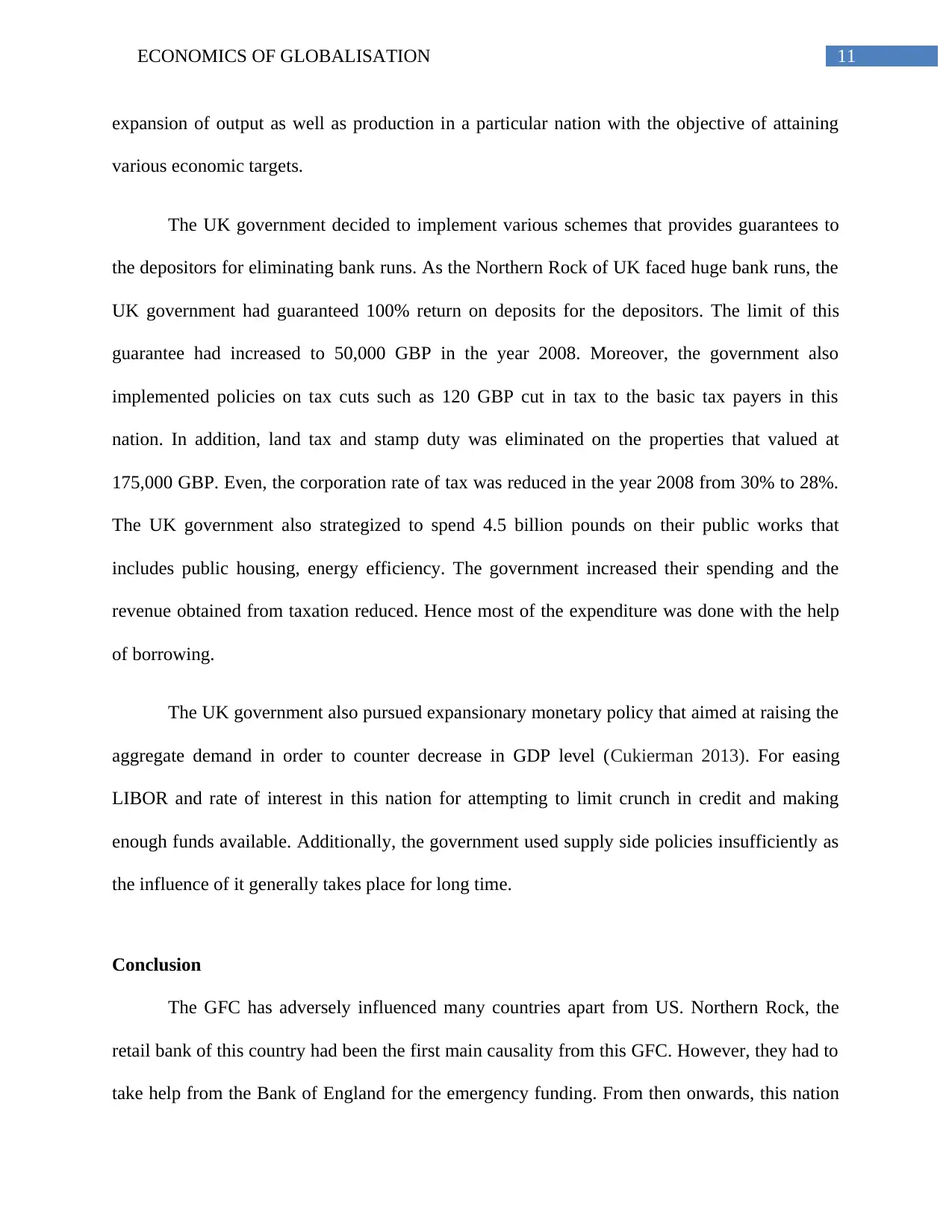
11ECONOMICS OF GLOBALISATION
expansion of output as well as production in a particular nation with the objective of attaining
various economic targets.
The UK government decided to implement various schemes that provides guarantees to
the depositors for eliminating bank runs. As the Northern Rock of UK faced huge bank runs, the
UK government had guaranteed 100% return on deposits for the depositors. The limit of this
guarantee had increased to 50,000 GBP in the year 2008. Moreover, the government also
implemented policies on tax cuts such as 120 GBP cut in tax to the basic tax payers in this
nation. In addition, land tax and stamp duty was eliminated on the properties that valued at
175,000 GBP. Even, the corporation rate of tax was reduced in the year 2008 from 30% to 28%.
The UK government also strategized to spend 4.5 billion pounds on their public works that
includes public housing, energy efficiency. The government increased their spending and the
revenue obtained from taxation reduced. Hence most of the expenditure was done with the help
of borrowing.
The UK government also pursued expansionary monetary policy that aimed at raising the
aggregate demand in order to counter decrease in GDP level (Cukierman 2013). For easing
LIBOR and rate of interest in this nation for attempting to limit crunch in credit and making
enough funds available. Additionally, the government used supply side policies insufficiently as
the influence of it generally takes place for long time.
Conclusion
The GFC has adversely influenced many countries apart from US. Northern Rock, the
retail bank of this country had been the first main causality from this GFC. However, they had to
take help from the Bank of England for the emergency funding. From then onwards, this nation
expansion of output as well as production in a particular nation with the objective of attaining
various economic targets.
The UK government decided to implement various schemes that provides guarantees to
the depositors for eliminating bank runs. As the Northern Rock of UK faced huge bank runs, the
UK government had guaranteed 100% return on deposits for the depositors. The limit of this
guarantee had increased to 50,000 GBP in the year 2008. Moreover, the government also
implemented policies on tax cuts such as 120 GBP cut in tax to the basic tax payers in this
nation. In addition, land tax and stamp duty was eliminated on the properties that valued at
175,000 GBP. Even, the corporation rate of tax was reduced in the year 2008 from 30% to 28%.
The UK government also strategized to spend 4.5 billion pounds on their public works that
includes public housing, energy efficiency. The government increased their spending and the
revenue obtained from taxation reduced. Hence most of the expenditure was done with the help
of borrowing.
The UK government also pursued expansionary monetary policy that aimed at raising the
aggregate demand in order to counter decrease in GDP level (Cukierman 2013). For easing
LIBOR and rate of interest in this nation for attempting to limit crunch in credit and making
enough funds available. Additionally, the government used supply side policies insufficiently as
the influence of it generally takes place for long time.
Conclusion
The GFC has adversely influenced many countries apart from US. Northern Rock, the
retail bank of this country had been the first main causality from this GFC. However, they had to
take help from the Bank of England for the emergency funding. From then onwards, this nation
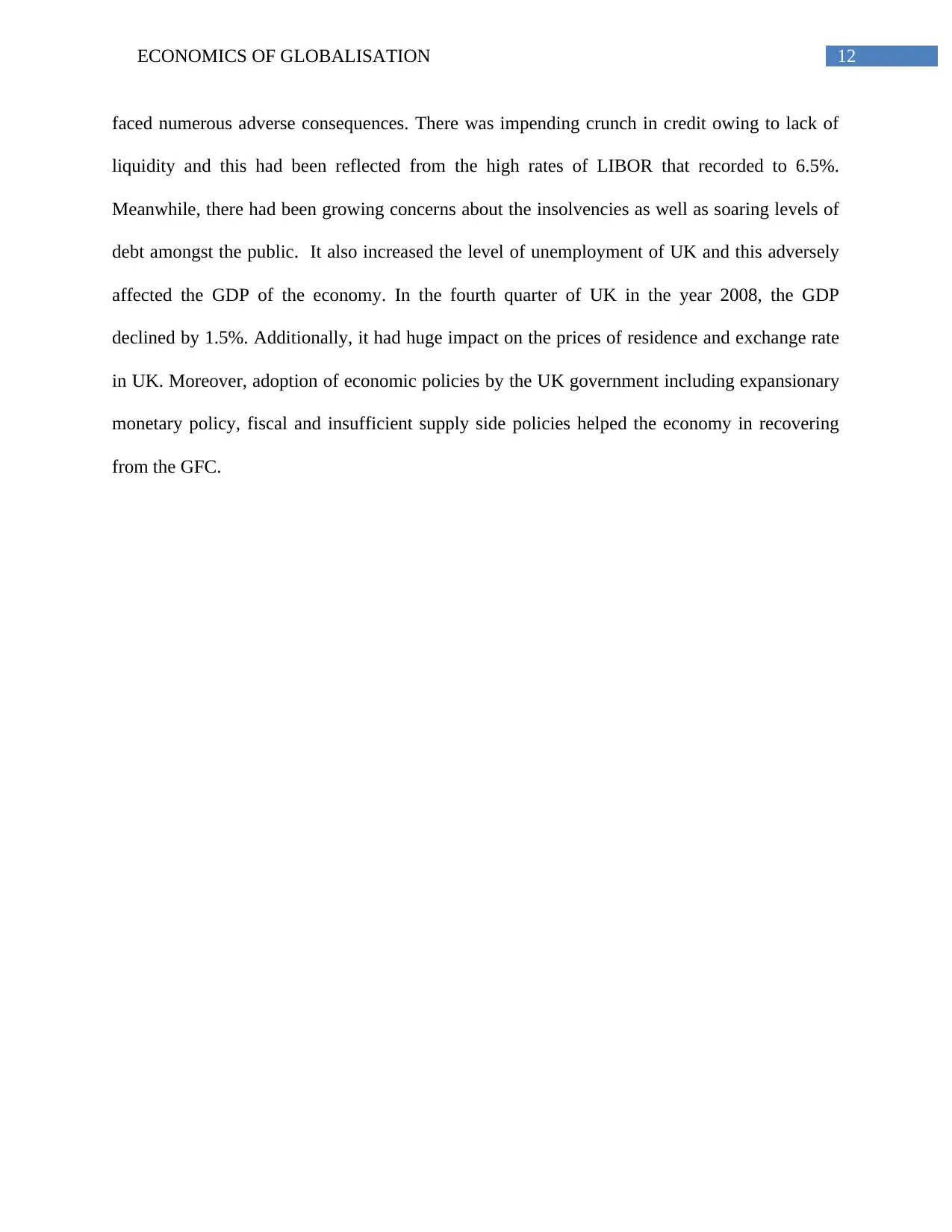
12ECONOMICS OF GLOBALISATION
faced numerous adverse consequences. There was impending crunch in credit owing to lack of
liquidity and this had been reflected from the high rates of LIBOR that recorded to 6.5%.
Meanwhile, there had been growing concerns about the insolvencies as well as soaring levels of
debt amongst the public. It also increased the level of unemployment of UK and this adversely
affected the GDP of the economy. In the fourth quarter of UK in the year 2008, the GDP
declined by 1.5%. Additionally, it had huge impact on the prices of residence and exchange rate
in UK. Moreover, adoption of economic policies by the UK government including expansionary
monetary policy, fiscal and insufficient supply side policies helped the economy in recovering
from the GFC.
faced numerous adverse consequences. There was impending crunch in credit owing to lack of
liquidity and this had been reflected from the high rates of LIBOR that recorded to 6.5%.
Meanwhile, there had been growing concerns about the insolvencies as well as soaring levels of
debt amongst the public. It also increased the level of unemployment of UK and this adversely
affected the GDP of the economy. In the fourth quarter of UK in the year 2008, the GDP
declined by 1.5%. Additionally, it had huge impact on the prices of residence and exchange rate
in UK. Moreover, adoption of economic policies by the UK government including expansionary
monetary policy, fiscal and insufficient supply side policies helped the economy in recovering
from the GFC.
Paraphrase This Document
Need a fresh take? Get an instant paraphrase of this document with our AI Paraphraser
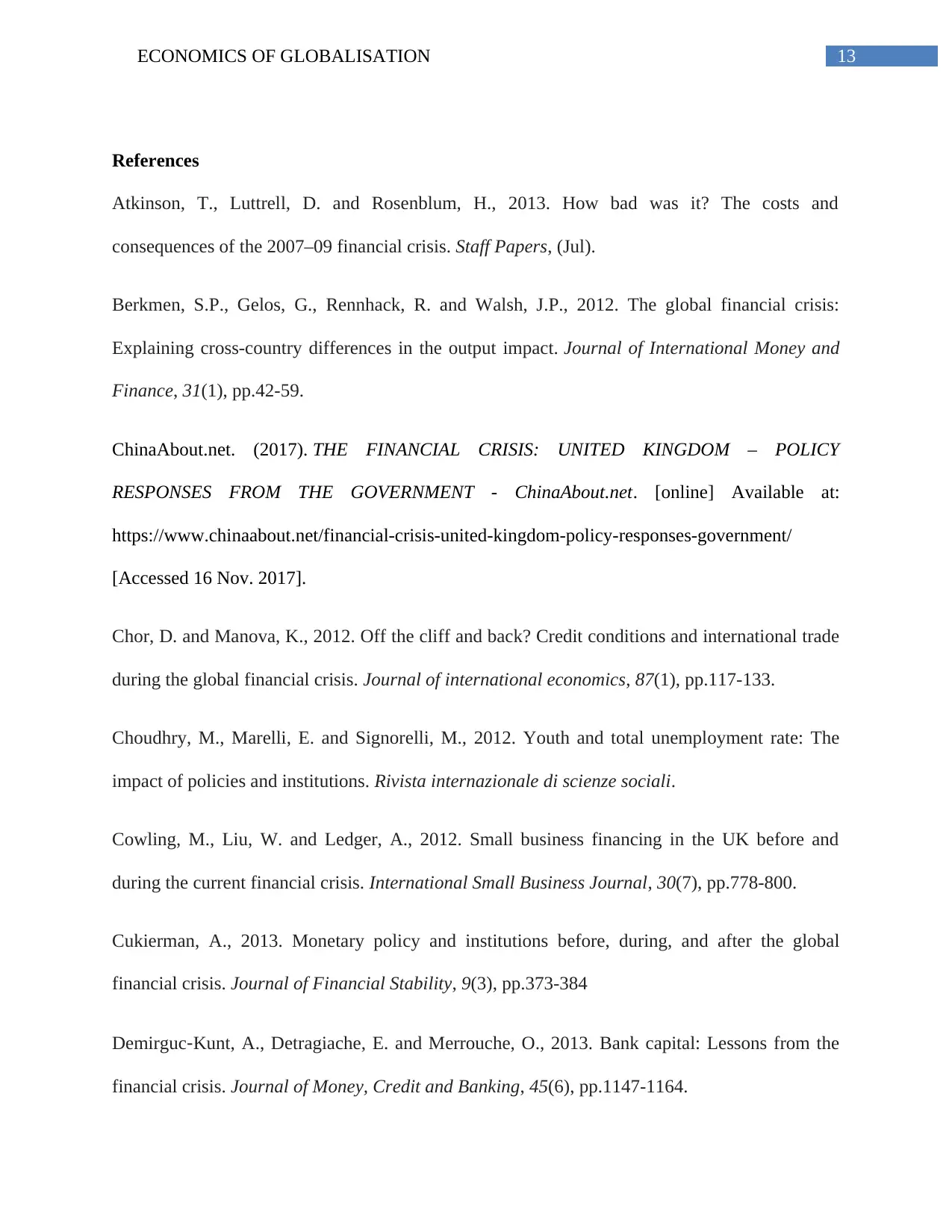
13ECONOMICS OF GLOBALISATION
References
Atkinson, T., Luttrell, D. and Rosenblum, H., 2013. How bad was it? The costs and
consequences of the 2007–09 financial crisis. Staff Papers, (Jul).
Berkmen, S.P., Gelos, G., Rennhack, R. and Walsh, J.P., 2012. The global financial crisis:
Explaining cross-country differences in the output impact. Journal of International Money and
Finance, 31(1), pp.42-59.
ChinaAbout.net. (2017). THE FINANCIAL CRISIS: UNITED KINGDOM – POLICY
RESPONSES FROM THE GOVERNMENT - ChinaAbout.net. [online] Available at:
https://www.chinaabout.net/financial-crisis-united-kingdom-policy-responses-government/
[Accessed 16 Nov. 2017].
Chor, D. and Manova, K., 2012. Off the cliff and back? Credit conditions and international trade
during the global financial crisis. Journal of international economics, 87(1), pp.117-133.
Choudhry, M., Marelli, E. and Signorelli, M., 2012. Youth and total unemployment rate: The
impact of policies and institutions. Rivista internazionale di scienze sociali.
Cowling, M., Liu, W. and Ledger, A., 2012. Small business financing in the UK before and
during the current financial crisis. International Small Business Journal, 30(7), pp.778-800.
Cukierman, A., 2013. Monetary policy and institutions before, during, and after the global
financial crisis. Journal of Financial Stability, 9(3), pp.373-384
Demirguc‐Kunt, A., Detragiache, E. and Merrouche, O., 2013. Bank capital: Lessons from the
financial crisis. Journal of Money, Credit and Banking, 45(6), pp.1147-1164.
References
Atkinson, T., Luttrell, D. and Rosenblum, H., 2013. How bad was it? The costs and
consequences of the 2007–09 financial crisis. Staff Papers, (Jul).
Berkmen, S.P., Gelos, G., Rennhack, R. and Walsh, J.P., 2012. The global financial crisis:
Explaining cross-country differences in the output impact. Journal of International Money and
Finance, 31(1), pp.42-59.
ChinaAbout.net. (2017). THE FINANCIAL CRISIS: UNITED KINGDOM – POLICY
RESPONSES FROM THE GOVERNMENT - ChinaAbout.net. [online] Available at:
https://www.chinaabout.net/financial-crisis-united-kingdom-policy-responses-government/
[Accessed 16 Nov. 2017].
Chor, D. and Manova, K., 2012. Off the cliff and back? Credit conditions and international trade
during the global financial crisis. Journal of international economics, 87(1), pp.117-133.
Choudhry, M., Marelli, E. and Signorelli, M., 2012. Youth and total unemployment rate: The
impact of policies and institutions. Rivista internazionale di scienze sociali.
Cowling, M., Liu, W. and Ledger, A., 2012. Small business financing in the UK before and
during the current financial crisis. International Small Business Journal, 30(7), pp.778-800.
Cukierman, A., 2013. Monetary policy and institutions before, during, and after the global
financial crisis. Journal of Financial Stability, 9(3), pp.373-384
Demirguc‐Kunt, A., Detragiache, E. and Merrouche, O., 2013. Bank capital: Lessons from the
financial crisis. Journal of Money, Credit and Banking, 45(6), pp.1147-1164.
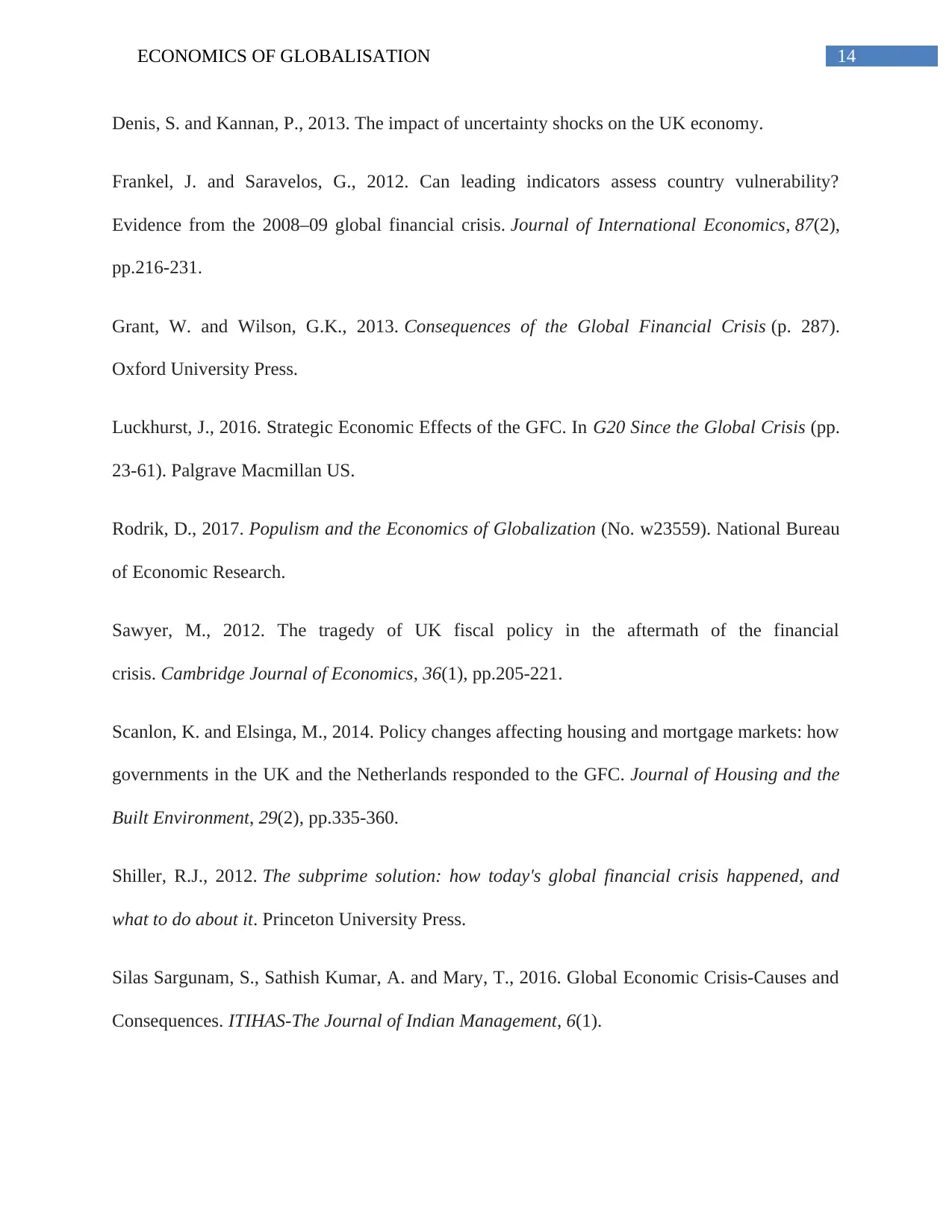
14ECONOMICS OF GLOBALISATION
Denis, S. and Kannan, P., 2013. The impact of uncertainty shocks on the UK economy.
Frankel, J. and Saravelos, G., 2012. Can leading indicators assess country vulnerability?
Evidence from the 2008–09 global financial crisis. Journal of International Economics, 87(2),
pp.216-231.
Grant, W. and Wilson, G.K., 2013. Consequences of the Global Financial Crisis (p. 287).
Oxford University Press.
Luckhurst, J., 2016. Strategic Economic Effects of the GFC. In G20 Since the Global Crisis (pp.
23-61). Palgrave Macmillan US.
Rodrik, D., 2017. Populism and the Economics of Globalization (No. w23559). National Bureau
of Economic Research.
Sawyer, M., 2012. The tragedy of UK fiscal policy in the aftermath of the financial
crisis. Cambridge Journal of Economics, 36(1), pp.205-221.
Scanlon, K. and Elsinga, M., 2014. Policy changes affecting housing and mortgage markets: how
governments in the UK and the Netherlands responded to the GFC. Journal of Housing and the
Built Environment, 29(2), pp.335-360.
Shiller, R.J., 2012. The subprime solution: how today's global financial crisis happened, and
what to do about it. Princeton University Press.
Silas Sargunam, S., Sathish Kumar, A. and Mary, T., 2016. Global Economic Crisis-Causes and
Consequences. ITIHAS-The Journal of Indian Management, 6(1).
Denis, S. and Kannan, P., 2013. The impact of uncertainty shocks on the UK economy.
Frankel, J. and Saravelos, G., 2012. Can leading indicators assess country vulnerability?
Evidence from the 2008–09 global financial crisis. Journal of International Economics, 87(2),
pp.216-231.
Grant, W. and Wilson, G.K., 2013. Consequences of the Global Financial Crisis (p. 287).
Oxford University Press.
Luckhurst, J., 2016. Strategic Economic Effects of the GFC. In G20 Since the Global Crisis (pp.
23-61). Palgrave Macmillan US.
Rodrik, D., 2017. Populism and the Economics of Globalization (No. w23559). National Bureau
of Economic Research.
Sawyer, M., 2012. The tragedy of UK fiscal policy in the aftermath of the financial
crisis. Cambridge Journal of Economics, 36(1), pp.205-221.
Scanlon, K. and Elsinga, M., 2014. Policy changes affecting housing and mortgage markets: how
governments in the UK and the Netherlands responded to the GFC. Journal of Housing and the
Built Environment, 29(2), pp.335-360.
Shiller, R.J., 2012. The subprime solution: how today's global financial crisis happened, and
what to do about it. Princeton University Press.
Silas Sargunam, S., Sathish Kumar, A. and Mary, T., 2016. Global Economic Crisis-Causes and
Consequences. ITIHAS-The Journal of Indian Management, 6(1).
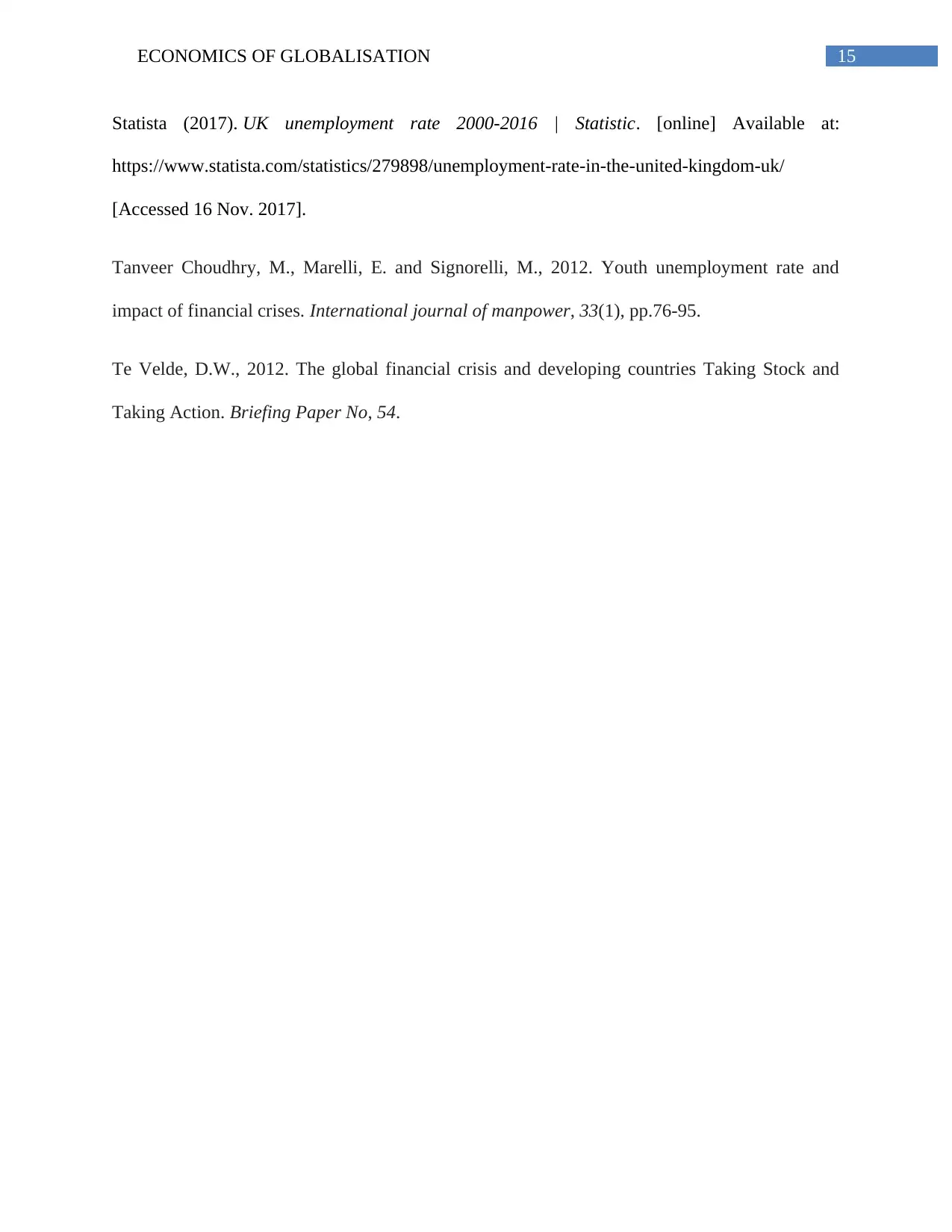
15ECONOMICS OF GLOBALISATION
Statista (2017). UK unemployment rate 2000-2016 | Statistic. [online] Available at:
https://www.statista.com/statistics/279898/unemployment-rate-in-the-united-kingdom-uk/
[Accessed 16 Nov. 2017].
Tanveer Choudhry, M., Marelli, E. and Signorelli, M., 2012. Youth unemployment rate and
impact of financial crises. International journal of manpower, 33(1), pp.76-95.
Te Velde, D.W., 2012. The global financial crisis and developing countries Taking Stock and
Taking Action. Briefing Paper No, 54.
Statista (2017). UK unemployment rate 2000-2016 | Statistic. [online] Available at:
https://www.statista.com/statistics/279898/unemployment-rate-in-the-united-kingdom-uk/
[Accessed 16 Nov. 2017].
Tanveer Choudhry, M., Marelli, E. and Signorelli, M., 2012. Youth unemployment rate and
impact of financial crises. International journal of manpower, 33(1), pp.76-95.
Te Velde, D.W., 2012. The global financial crisis and developing countries Taking Stock and
Taking Action. Briefing Paper No, 54.
1 out of 16
Related Documents
Your All-in-One AI-Powered Toolkit for Academic Success.
+13062052269
info@desklib.com
Available 24*7 on WhatsApp / Email
![[object Object]](/_next/static/media/star-bottom.7253800d.svg)
Unlock your academic potential
© 2024 | Zucol Services PVT LTD | All rights reserved.





